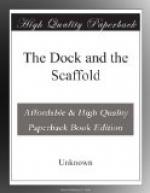About the 26th of May the ship left the Sligo coast. On the 1st of June she arrrivcd at Dungarvan. During the voyage councils were held on board. Provisions were running short, and they could not remain much longer at sea. These matters were made the subjects of discussion. Some were for going to America, and some for landing; and at last the conclusion was arrived at that the majority of the officers should be landed, and that the others should go either to America or to the Western Isles—the Hebrides. They hailed a large fishing boat, and offered the man on board L2 to put two men on shore. He went on board the brigantine, and when he did so, twenty-eight men who were hitherto concealed, rushed on board his ship. He asked them if he would land them at Helwick Point, and they said no, because there was a coastguard station there. They were eventually landed about two miles from that point, and they were compelled to wade through water three-and-a-half feet deep to the shore.
So far the learned gentleman, her Majesty’s Attorney-General for Ireland. His statement was supported by the informations and the evidence of an informer, Daniel J. Buckley, the Judas of the expedition. He, however, represented Kavanagh as the captain of the vessel, and General James E. Kerrigan as chief of the military expedition. As to the armament on board, they had, he said, “some Spencer’s repeating rifles, seven-shooters, and some Enfield rifles, Austrian rifles, Sharp’s and Burnside’s breech-loaders, and some revolvers. There were about 5,000 stand of arms on board, and three pieces of artillery, which would fire three-pound shot or shell. With these pieces the salute was fired on the occasion of hoisting the sunburst on Easter Sunday. As regards ammunition, there were about a million-and-a-half rounds on board.”
Colonel S.R. Tresilian, in the lecture already alluded to, gave the following facetious account of the warlike stores which were on board the vessel:—
We found the cargo to consist of 5,000 rat-tail files, of different sizes and descriptions. Then there were several smaller files that mechanics carry in their pockets; then again there was the flat file, in respectable numbers, that are used for cutting on either edge, and that are carried in sheathes, to prevent the mechanics from cutting their neighbours’ fingers. These files were to be distributed to the paupers in Ireland, to enable them to sharpen their teeth, so that they could masticate animal food at the grand barbecue that was to be given on the landing of our vessel. Another portion of the cargo was 200,000 puff-balls and sugar-plums, for gratuitous distribution among our English friends and brethren in Ireland.
It surely was a daring venture to run that craft, freighted as she was, across the ocean, and sail her for days along the coast of Ireland. The lecturer gave the following account of her voyagings:—




